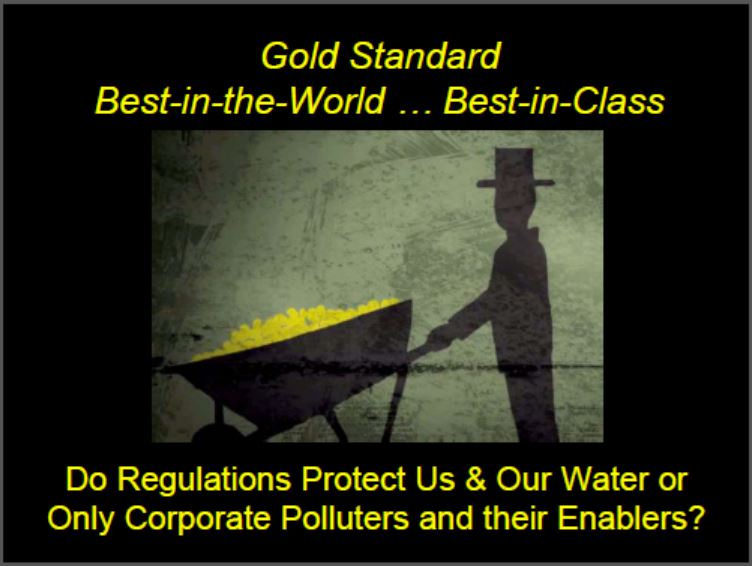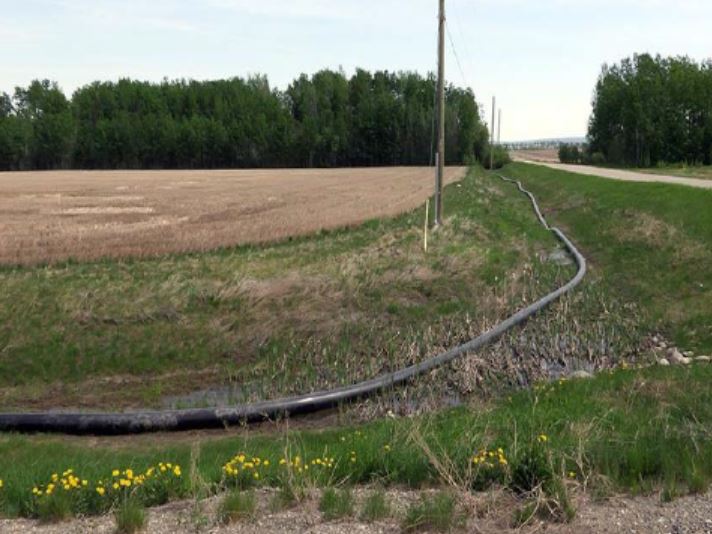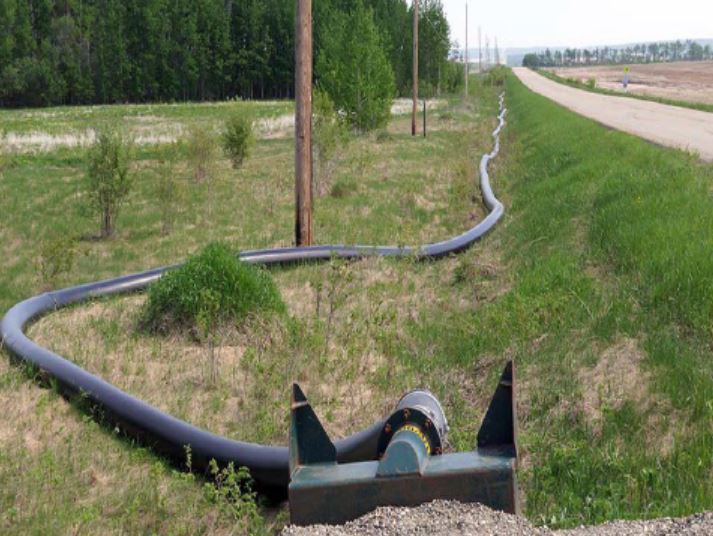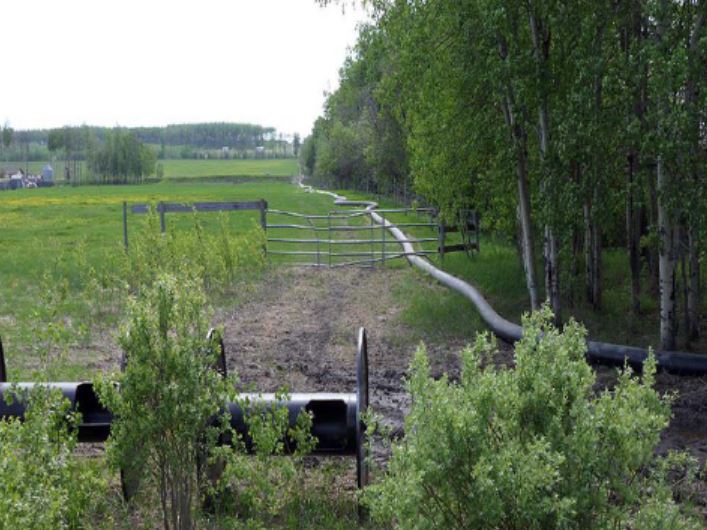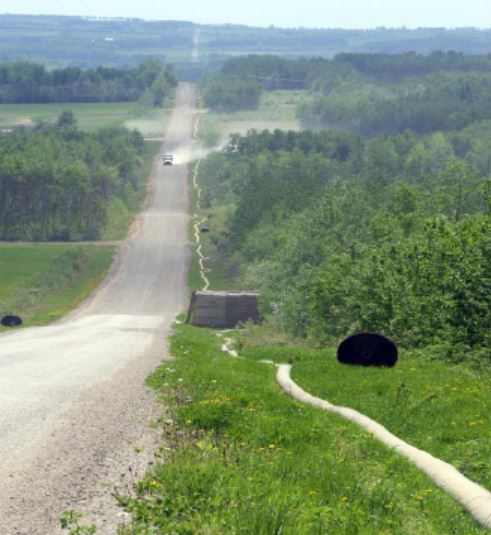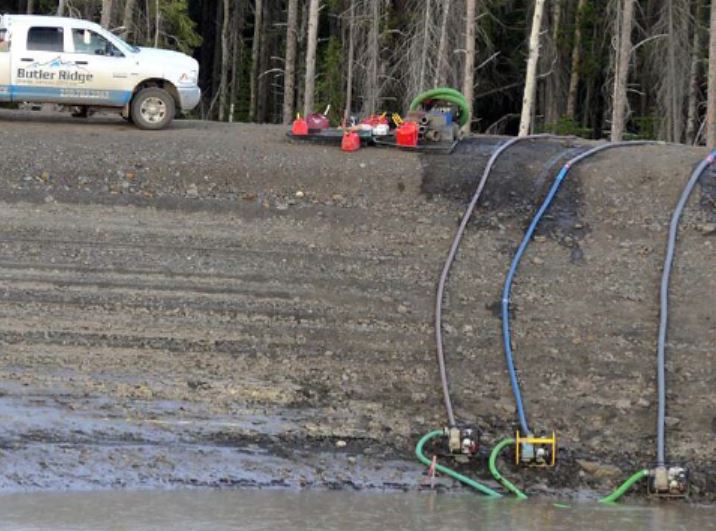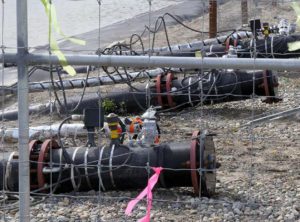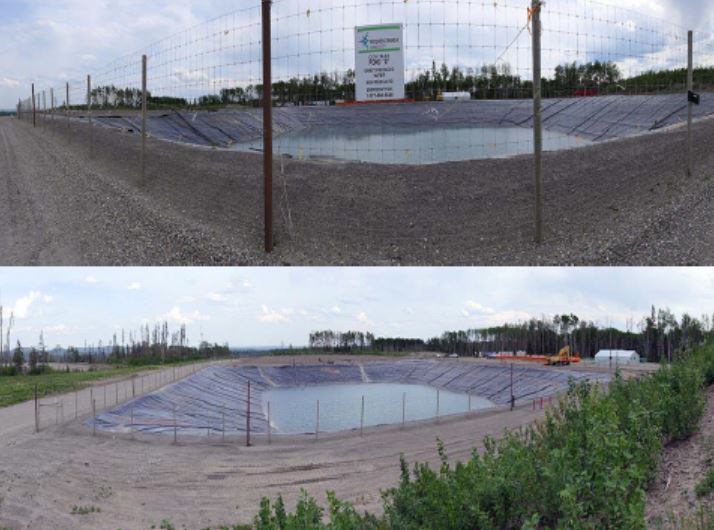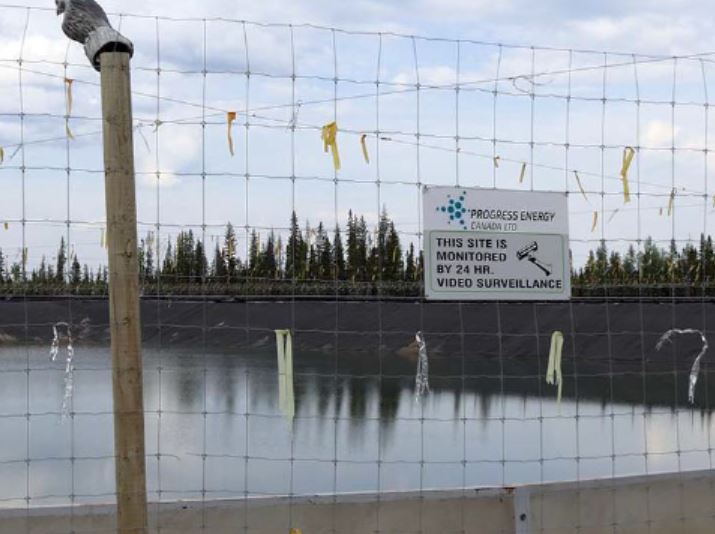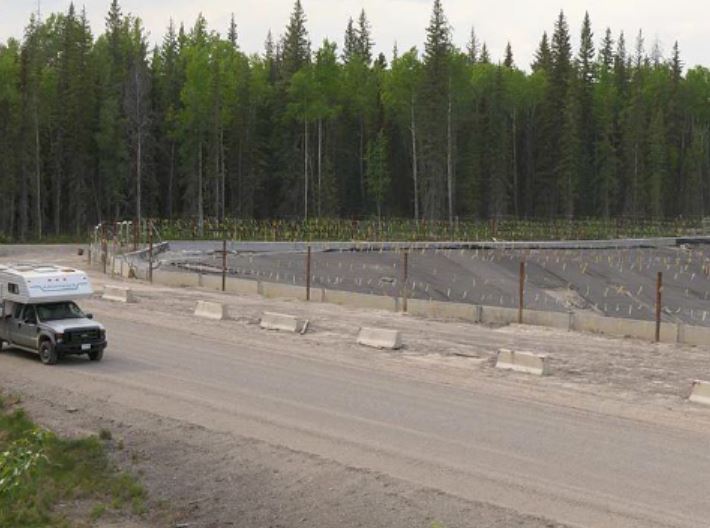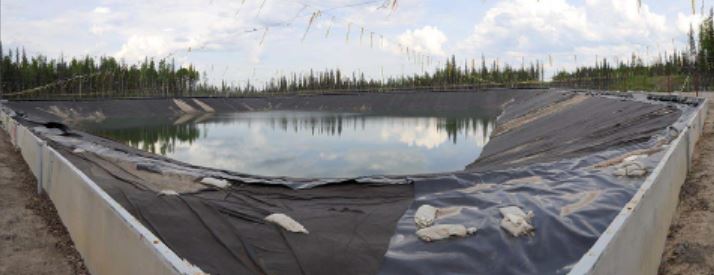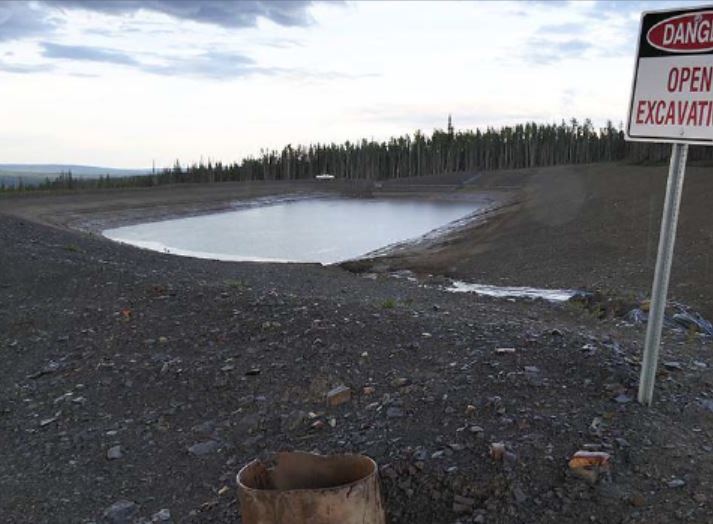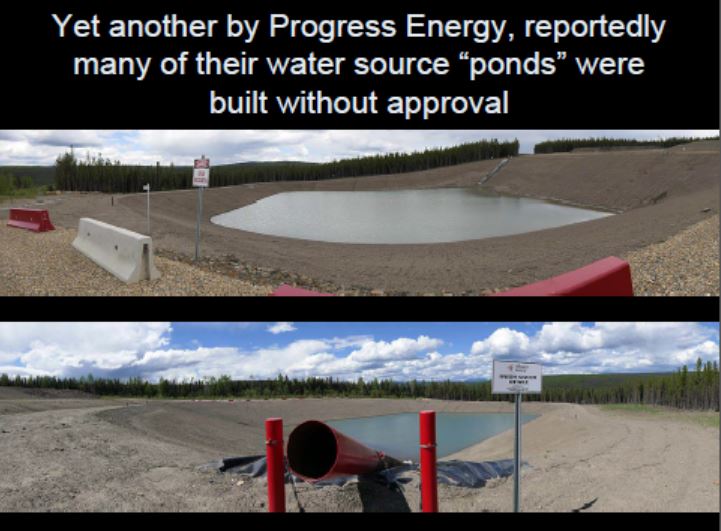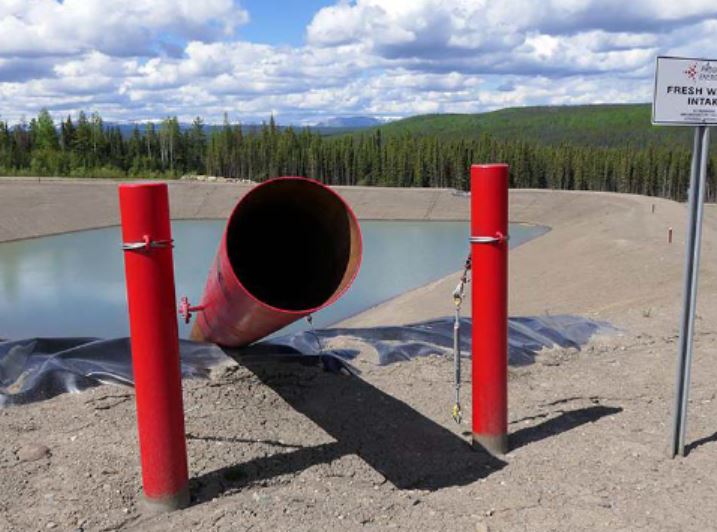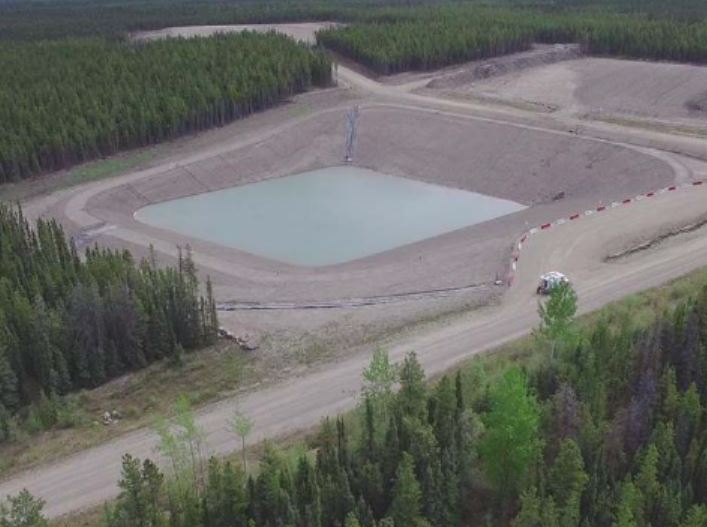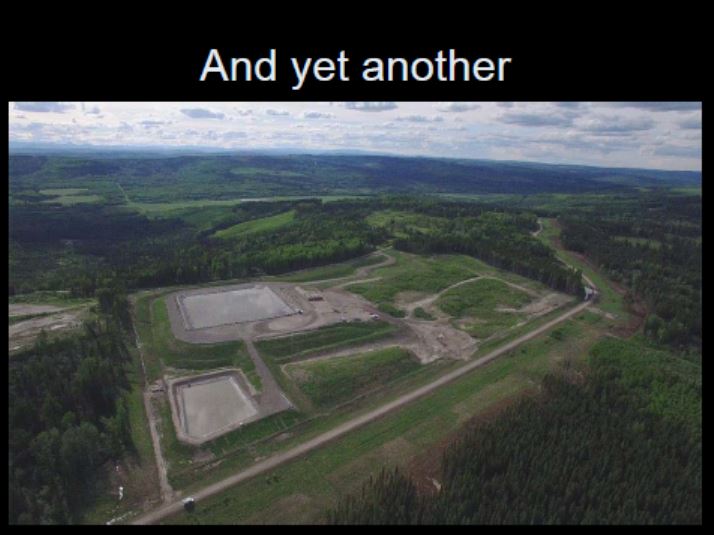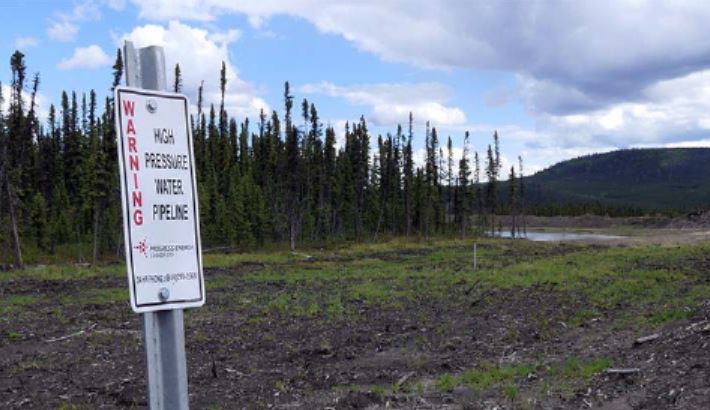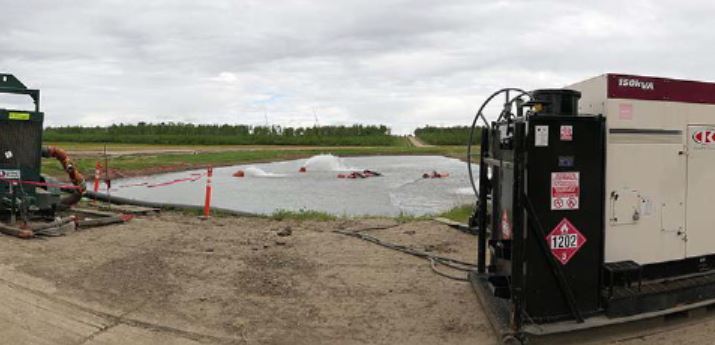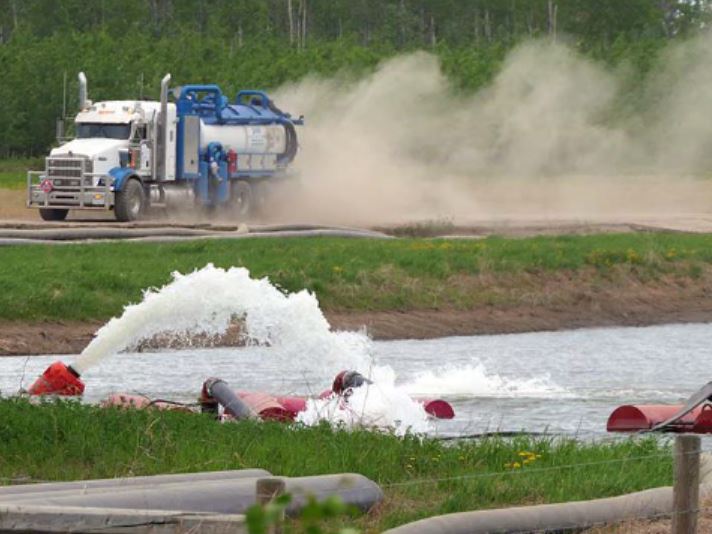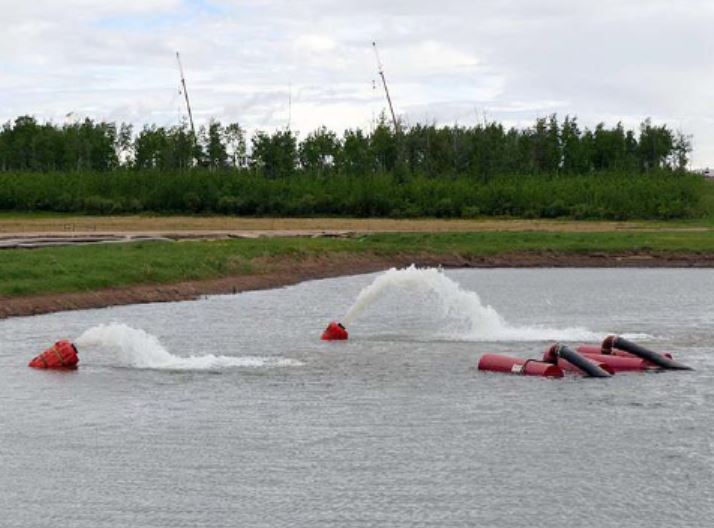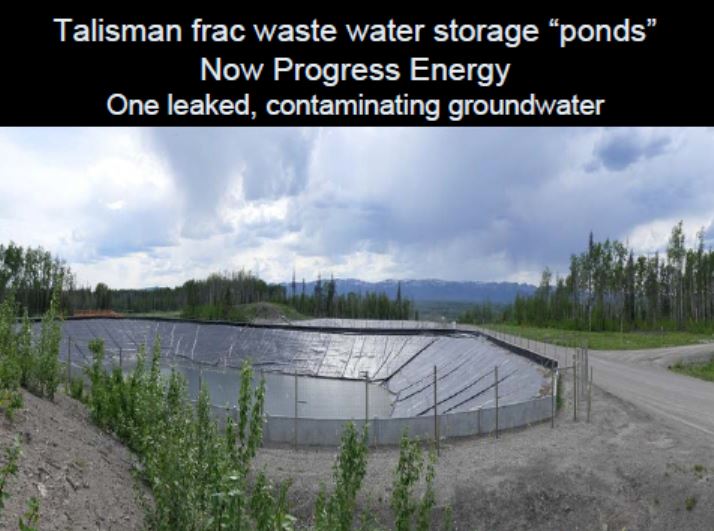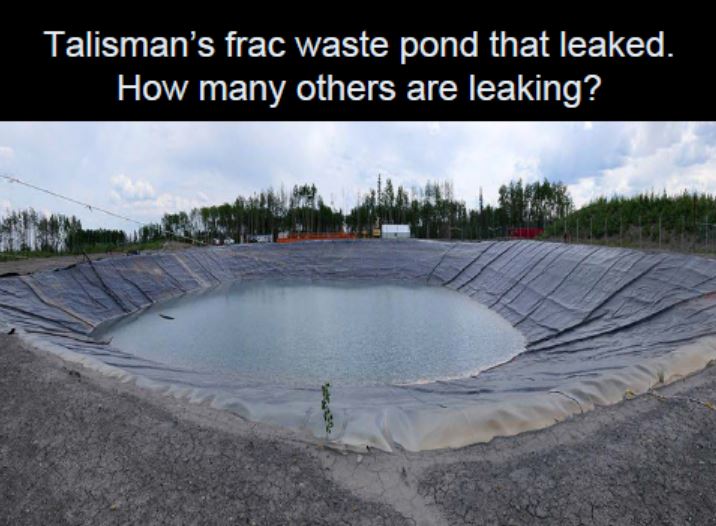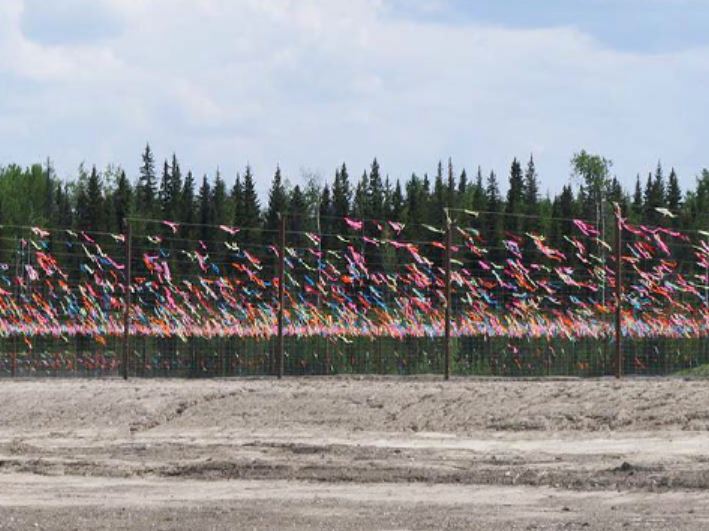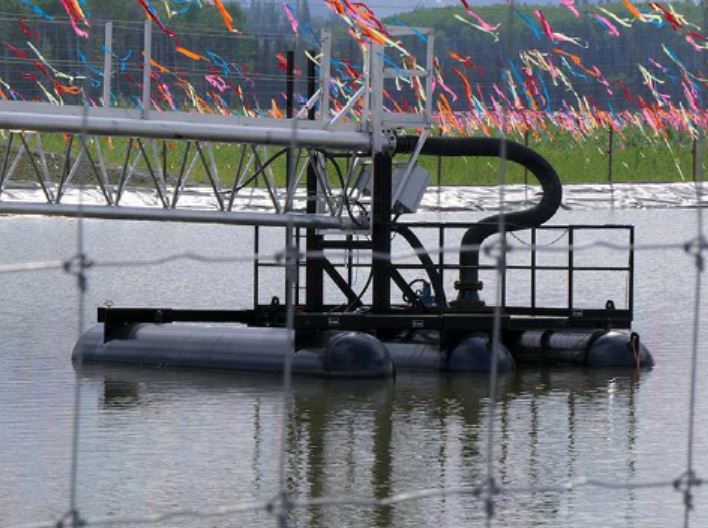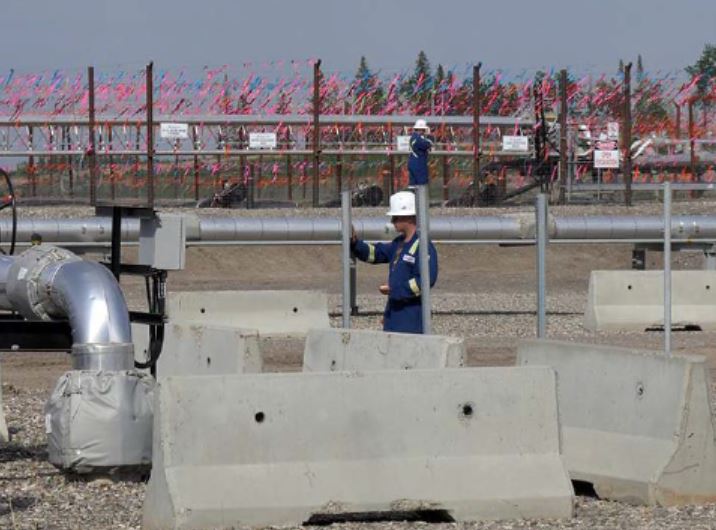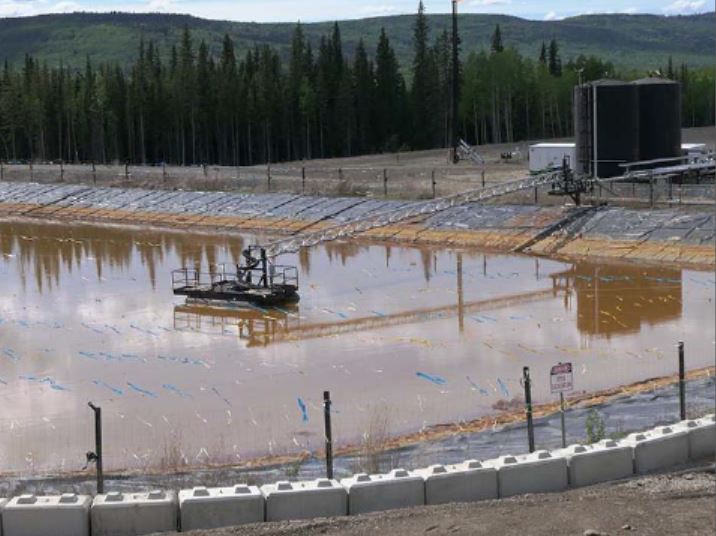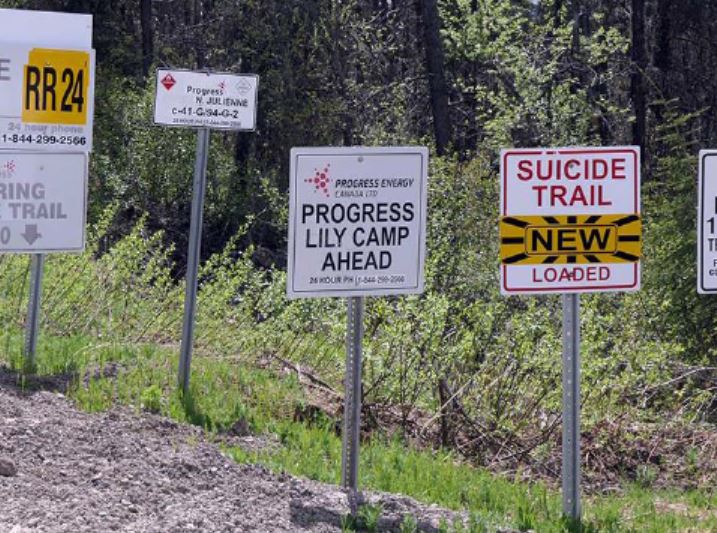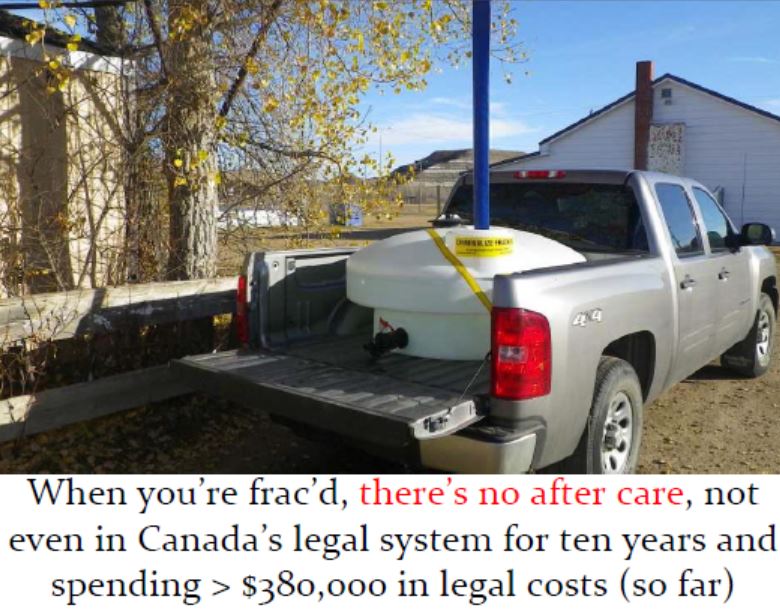Synergy Alberta’s evil seems complicated.
If you say no to the money and think about it with your greed & blinders off, you’ll get it.
***
Let’s start with some Canadian frac harm study and public input history:
2002: 15 years ago, Ministers of the Environment in Canada, regulators and more, and groundwater expert Dr. John Cherry, studied the impacts to groundwater from development of unconventional gas (ie frac’ing). This is what Cherry reported (in writing):
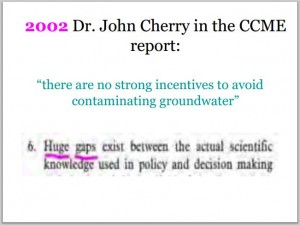
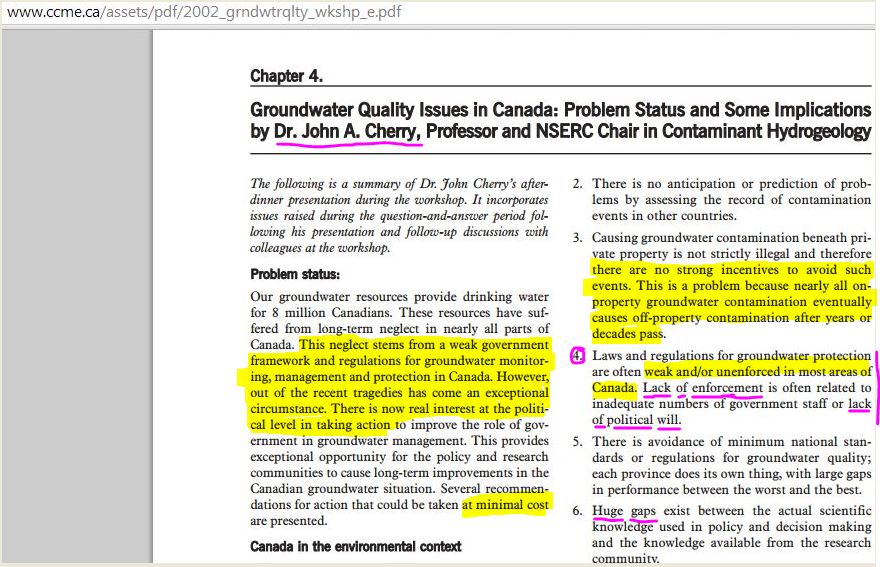
After Ernst filed this vital and very damning report in her document exchange with EnCana in October 2014, it was removed from the Council of Ministers of the Environment’s website.
Ernst uploaded it to her website, to keep the report public.
This is what the council concluded, 15 years ago!
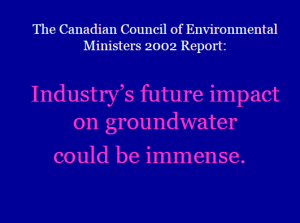
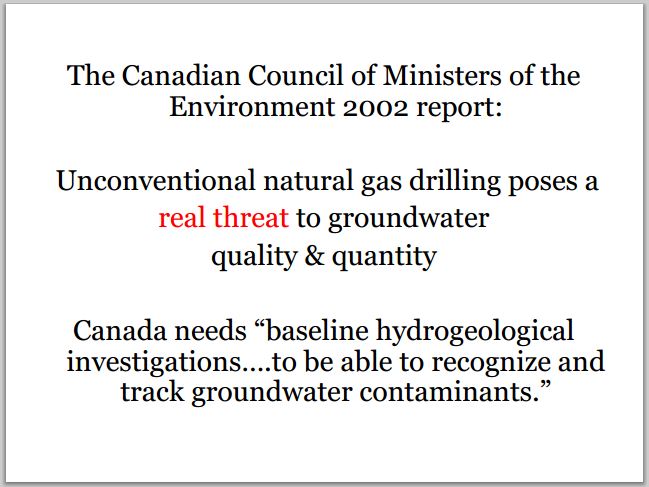
Companies, regulators, experts and more, have known what the risks are for years.
2003 to current: Ernst (unpaid) began researching and warning people about frac risks and harms; since 2005, she has been invited to present in formal public presentations, often to overflowing halls (eg over 600 Albertans attended one rural event in 2006 at Trochu), and/or helping communities keep fracing out, for example in:
- BC;
- New York State;
- Michigan;
- Ireland;
- UK;
- Quebec;
- Nova Scotia;
- New Brunswick;
- PEI;
- Newfoundland and Labrador; and even
- Alberta: Cities of Calgary and Lethbridge, both kept fracing out, after loud and large public outcry and protests.
2010 10 14: 7 years ago! FRACTURE LINES: WILL CANADA’S WATER BE PROTECTED IN THE RUSH TO DEVELOP SHALE GAS? by Ben Parfitt, Canadian Centre Policy Alternatives~! released publicly:
On October 14, 2010, POWI released a discussion paper and held a conference on Fracture Lines: Will Canada’s Water Be Protected in the Rush to Develop Shale Gas? The conference and the discussion paper were the first major formal public discussion in Canada of the shale gas issue. … The Fracture Lines paper outlined the potential impacts of shale gas exploration and production on groundwater resources, and described the paucity of groundwater mapping and lack of effective regulatory oversight. With possible shale gas deposits in BC, Alberta, Saskatchewan, Ontario, Quebec and New Brunswick and a loud public outcry against shale gas drilling in Quebec [Ben admits, in writing, 7 years ago that many other jurisdictions were at risk and or have been impacted], the conference attracted a wealth of attention. Because of its availability in both languages and its timeliness, the conference received extensive media coverage and over 500 logins to the webcast.
In the wake of the conference, the research contained in the Fracture Lines report was determined to be a major factor in the decision to expand the terms of reference for a Parliamentary Committee studying offshore drilling issues in Canada. The Committee opted to include shale gas in its deliberations.
The issue of how to protect groundwater resources from the impacts of shale gas exploration continues to be a burning issue, across Canada and around the world.
2014 04: 3.5 Years ago! Dr John Cherry and his Council of Canadian Academies Frac Panel released their huge shale gas impact study, lying in it (claiming that frac’ing deep formations had never contaminated fresh ground water or a water well) and completely ignoring what Cherry and the Ministers of the Environment warned twelve years earlier in 2002!
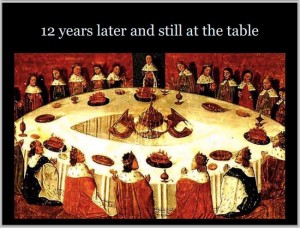
More studies on frac harms were completed by expert frac panels for Nova Scotia, New Brunswick, British Columbia, Yukon and Newfoundland!
What came out of all that “expert” study into the harms and risks, including by Ben Parfitt?
Steady propaganda, lies, more lies, massive secret deregulation by regulators and governments, while publicly lying and promising the opposite. Cherry, Parfitt and the frac-enabling groups know this, yet they keep repeating themselves, asking for regulation, giving industry and governments more social licence to frac while the damages become worse and more families and communities are seriously harmed and repeatedly refrac’d.
More synergy by more and more corrupted groups spread by Synergy Alberta (oil industry lobby groups and AER) feeding greed and ego to enable escalating frac’ing, starting with Pembina Institue in Alberta.
Now they dangle “regulation” again to keep the frac frenzy alive.
For how many years will industry’s synergy con rage on?
BRAVO! THIS COMMENTER GETS IT, AS DOES DIANA DAUNHEIMER (see below)!
TYEE PUBLISHED MOSTLY COPY OF THE PRESS RELEASE, INCLUDED BELOW https://thetyee.ca/Opinion/2017/11/07/bc-needs-public-inquiry-fracking/
***
Even reported by the Calgary Herald
One comment, note Ms Daunheimer doesn’t ask for frac regulation:
Diana Daunheimer
Never has a play been fractured with just water.
Fracture slurries are a complex mix of compounds, which include proppants, energizers, biocides, surfactants, corrosion inhibitors, stabilizers, cross linkers, ph adjusters, gelling agents and scale inhibitors. In some cases, such as the 6 wells that surround our home, and thousands more in hyrophillic plays, no water is used at all, base fluids are hydrocarbons, such as kerosene or gelled propane. CBM wells are often fractured with gases, such as nitrogen.
After the well is fracked, a second set of chemical breakers are pumped down hole, to “break” the gelled slurries, so that fluids return to surface and proppants remain in the induced fractures.
We need a national inquiry, to address known public health and environmental damages.
[In Encana’s early CBM experimental years (2001-2005), the company frac’d CBM with water, causing significant damage to formation and gas wells (and likely causing significant leakage and gas migration). Encana admitted in a public meeting in Rosebud, that it took the company 2-3 years to learn how to brute force frac CBM and how to force the reluctant methane to let go of the tight formations.
Afterwards, many of Encana’s nitrogen fracs were/are foamed or gelled, mixed with variety of chemicals. In 2004, Encana injected 18 million litres of frac fluid directly into Rosebud’s drinking water aquifers and refuses to disclose to the community, and even with the Alberta Rules of Court requiring complete chemical disclosure with no trade secrets allowed, refuses to disclose to Ernst the chemicals injected into the aquifers that supply the community and Ernst’s water well.
Good old nasty Synergy alberta, very bad approach, calling for regulations, which gives industry social licence to frac us, under guise of calling for an inquiry.
Sneaky, dirty, nasty, but, the groups are after money (eg “proper funding”). Many of the 17 groups (see below) have for years been undermining Ernst’s (unpaid) work (trying to warn the public about how bad frac’ing is). That’s the purpose of Synergy: Enable fracking no matter what, under the guise of collaboration, asking for regulation, while stomping out the harmed voices.
The groups claim regulations make fracing safe even though they know it’s been proven again and again that nothing can make frac’ing safe. Just look to the deregulation happening everywhere where the new “brute force” frac’ing takes place (eg even in BC: the deregulated, watered down “Water Act”)
At the time of the water contamination and water well/tower explosions and law violations by companies, provinces had excellent regulations and laws not yet deregulated in place. What good did they do the many harmed in BC, Alberta, Saskatchewan, Manitoba, Quebec, etc?
Our courts are unable to publish the truth, or uphold the law when it comes to frac’ing and the AER.
How will “regulations” protect anyone or anything?]
THE PRESS RELEASE:
Public inquiry needed to properly investigate deep social and environmental harms of fracking, coalition says by Canadian Centre for Policy Alternatives, November 6, 2017
VANCOUVER – A promised “review” of natural gas industry fracking operations should be broadened to a full Public Inquiry that examines all aspects of the dangerous gas extraction technique, says a coalition of community, First Nation and environmental organizations.
The call on the new BC government is to broaden a promise first made by the NDP during the lead-up to the spring provincial election, and comes on the heels of new revelations about the fracking process, including:
- Escalating water usage by fracking companies.
- Poor or misleading consultations with First Nations.
- Widespread industry non-compliance with relevant provincial water laws through the construction of dozens of unlicensed dams.
- Record-setting induced earthquakes at BC fracking operations.
“We believe that the NDP’s campaign promise to appoint a scientific panel to review fracking won’t be enough to fully address the true risks of deploying this brute-force technology throughout northeast BC. Current realities dictate that we need a wide-ranging, public inquiry,” says Ben Parfitt, a resource policy analyst with the Canadian Centre for Policy Alternatives, one of 17 groups making today’s call.
The groups say a comprehensive examination of fracking is essential and that a broad formal Public Inquiry or Commission of Inquiry is necessary to investigate all the risks and harms associated with it. The Inquiry must address whether or not provincial agencies adequately oversee fracking operations, ensuring that companies comply with existing laws and regulations [ASKING FOR THIS GIVES INDUSTRY AND ITS ENABLERS (AER, OGC, ETC) SOCIAL LICENCE TO FRAC US ALL], safeguard public health, and protect the environment. The Inquiry must have powers and sufficient funds to compel legal testimony, commission professional research, and hold public hearings across BC.
Hydraulic fracturing or fracking involves pumping large volumes of water under intense pressure below ground to free gas trapped in tight rock formations.
In August 2015 a 4.6 magnitude earthquake — the largest ever induced by a fracking operation [IN BC, LARGER QUAKES HAVE BEEN CAUSED BY FRAC’ING ELSEWHERE]— occurred in northeast BC when 422 million gallons of water was pumped underground at one gas well. The amount of water used was more than eight times greater than that used in the average fracking operation in the United States.
Recently, the Canadian Centre for Policy Alternatives reported on a major regulatory breakdown as fracking companies rushed to build dozens of unlicensed dams for use in their water-intensive fracking operations in northeast BC.
“We are deeply troubled that this dam-building free-for-all occurred on First Nation lands, that First Nations were not fully consulted about the true size and extent of these dams, and that our Indigenous Title, Rights and Treaty rights are still completely ignored or denied. There are still no substantive or meaningful opportunities to fully participate in decisions around how water resources are managed in our respective territories,” says Grand Chief Stewart Phillip, President of the Union of BC Indian Chiefs. “We need a credible, strong, Independent Inquiry to get to the bottom of this.”
“Right now, we know that British Columbians are not getting accurate and transparent information about the real environmental damages from oil and gas activities,” said Ian Bruce, Director of Science and Policy at the David Suzuki Foundation. “Our peer-reviewed researchshows that methane pollution from B.C.’s oil and gas sector, mainly fracked gas, is at least 2.5 times larger than what both industry and the B.C. government report.”
“We are calling on the B.C. government to make it a priority to get this pollution problem under control by enacting proper oversight and regulations and ensure industry is responsible for being part of the solution.” [ASKING FOR THIS GIVES INDUSTRY AND ITS ENABLERS SOCIAL LICENCE TO FRAC US ALL]
“Recent studies have demonstrated an increase in premature births, asthma, and congenital heart defects in people who live close to U.S. fracking operations,” says Dr. Larry Barzelai, head of the BC Chapter of the Canadian Association of Physicians for the Environment. “Can we be assured that the same complications will not occur in B.C.? We think that a properly funded Public Inquiry, with a comprehensive and strong mandate, is needed to answer critical questions such as these.”
Among the questions the groups say a Public Inquiry on fracking should address are:
- Have natural gas companies and provincial regulators appropriately consulted with First Nations about the ongoing cumulative impacts of fracking industry activities on their traditional lands, as required by law and the UN Declaration on the Rights of Indigenous Peoples?
- What is the true extent of public health and safety risks associated with fracking?
- What risks does fracking pose to the environment and water resources in particular?
- What threats does fracking pose to critical infrastructure?
- How much more will BC’s greenhouse gas emissions climb as a result of methane emissions if more gas is drilled and fracked?
- Does BC’s Oil and Gas Commission adequately monitor the fracking industry, ensuring that it complies with all relevant laws? Is it transparent and does it keep the public fully informed?
The previous government ignored a call for such an inquiry in 2011.
The organizations jointly issuing this release:
[What?! No Pembina Institute? Is that because the NGO is so obviously in the oil and gas industry’s pocket and has tried for years to synergize Ernst, but failed?
Canadian Centre for Policy Alternatives’ BC Office
Union of BC Indian Chiefs
Canadian Association of Physicians for the Environment
David Suzuki Foundation
Wilderness Committee
West Coast Environmental Law
SkeenaWild Conservation Trust
Sierra Club BC
Saanich Inlet Network
Public Health Association of BC
My Sea to Sky
Keepers of the Water
Friends of Wild Salmon Coalition
Douglas Channel Watch
Council of Canadians
Corporate Mapping Project
BC Tap Water Alliance [The others on the list are synergized; they want to get paid to collaborate and chat together to enable frac’ing to escalate. But, BC TAP WATER ALLIANCE? Heaven help us all. ]
More than two dozen groups join call for fracking inquiry in B.C. by Patrick Johnston, November 6, 2017, Vancouver Sun
A coalition of community, First Nation and environmental organizations wants the provincial government to expand a promised review of natural gas fracking operations into a full public inquiry.
“We believe that the NDP’s campaign promise to appoint a scientific panel [appointments to be Encana controlled, like Quebec’s expert frac panel was entirely industry controlled, leading to the overturning of their frac moratorium?] to review fracking won’t be enough to fully address the true risks of deploying this brute-force technology throughout northeast B.C. Current realities dictate that we need a wide-ranging public inquiry,” Ben Parfitt, a resource policy analyst with the Canadian Centre for Policy Alternatives, said in an emailed statement on Sunday.
Fracking — also known as hydraulic fracturing — involves pumping large volumes of water under intense pressure below ground to free gas trapped in tight rock formations.
Fracking leads to higher rates of earthquakes and the coalition says there are also concerns about how much water is being used in fracking operations, as expressing concerns for how truthfully the companies have engaged with local Indigenous peoples and they say there is “widespread industry non-compliance with relevant provincial water laws through the construction of dozens of unlicensed dams.”
A 4.6 magnitude earthquake in northeast B.C. in August 2015 was caused by 422 million gallons of water being pumped underground at one gas well, the B.C. Oil and Gas Commission confirmed at the time. According to the coalition, this is eight times greater than that used in the average fracking operation in the United States.
That earthquake was the largest in B.C. caused by fracking.
Grand Chief Stewart Phillip, President of the Union of B.C. Indian Chiefs, said “First Nations were not fully consulted about the true size and extent of these dams and that our Indigenous Title, Rights and Treaty rights are still completely ignored or denied.”
“We are deeply troubled that this dam building free-for-all occurred on First Nation lands,” he added.
He also said have been “no substantive or meaningful opportunities to fully participate in decisions around how water resources are managed in our respective territories.”
The head of the B.C. chapter of the Canadian Association of Physicians for the Environment raised concerns about the health risks posed by fracking.
“Recent studies have demonstrated an increased incidence of premature births, asthma and congenital heart disease in people who live close to U.S. fracking operations,” Larry Barzelai said. “Can we be assured that the same complications will not occur in B.C.? We think that a properly funded public inquiry, with a comprehensive and strong mandate, is needed to answer critical questions such as these.”
The coalition wants the inquiry, which they want to be properly funded [Key indicator that Synergy Alberta is leading this request for a frac inquiry, with the repeat requests for funding] and able to compel legal testimony, to look at whether there’s enough provincial oversight of fracking operations when it comes to compliance with regulations, in protecting public health and preserving the environment.
[Asking for Regulations Under Guise of Asking for Public Inquiry Check:
Why bother wasting years and taxpayer money asking for an inquiry? The science is already long in.
To let the frac harms continue while the inquiry drags on for years, copying Synergy Alberta’s strategy of paying and controlling outspoken concerned intelligent citizens via NGOs to collaborate in an inquiry (round table) that will only be allowed to have the predetermined outcome likely already dictated to government in secret by the frac’ers?
Centre for Policy Alternatives knows better than to ask for an inquiry now, years too late. So does Council of Canadians and most of the other groups on the list. The big shock is BC Tap Water Alliance signing on.
What happened to wanting frac’ing stopped to protect public health, food, air, lands and water?
This inquiry request is a sure fire set-up to get better “Best in the world” and “World Class” regulations that will benefit the frac polluters even more than the current regulations do.
Watch Ernst explain in her recent talk in Malton, North Yorkshire UK and learn how well frac “regulations” serve only the polluters and not the environment or people living frac’d:
In her talk, Ernst presents some of Will Koop’s shocking 2017 photos of some of the illegal dams built by industry, along with miles of water hoses and pumps to fill those illegal dams with water hoarded for fracking. Koop also took excellent horrifying photos of some of the toxic frac waste dams.
PDF of Ernst’s slides of her Malton talk (large file, takes time to download because of the many photos included).
PDF of some of Will Koop’s illegal frac dam and water line photos HOW DID THEY SYNERGIZE WILL KOOP?
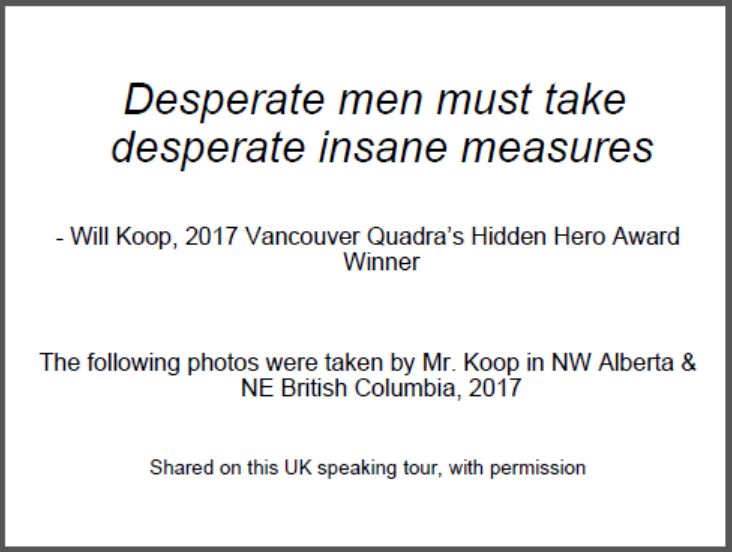
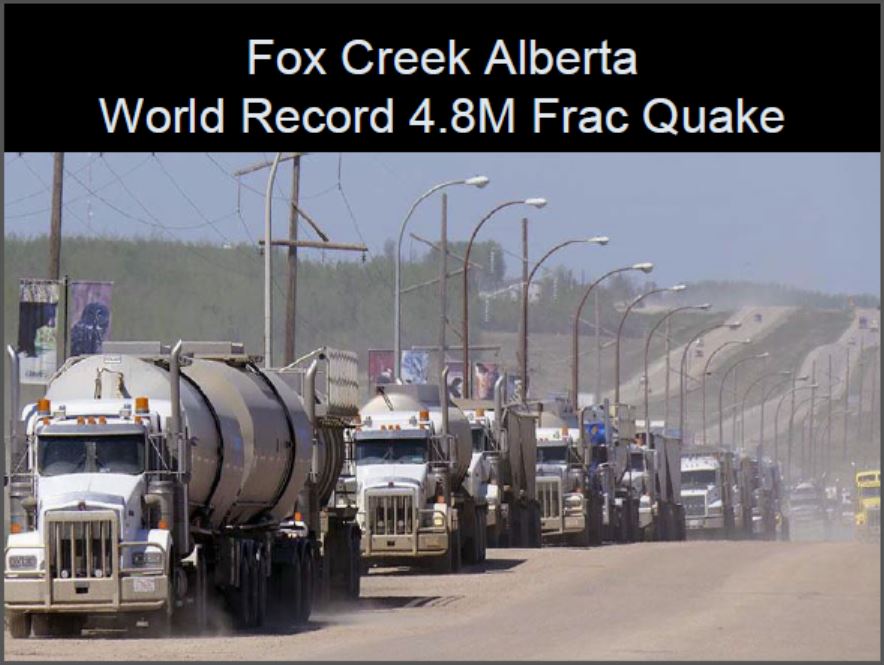
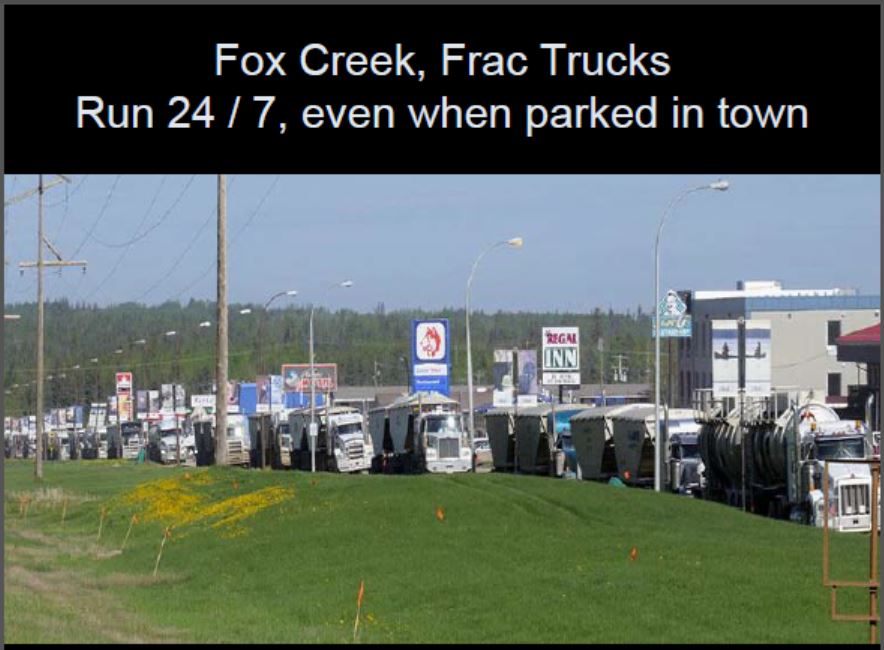
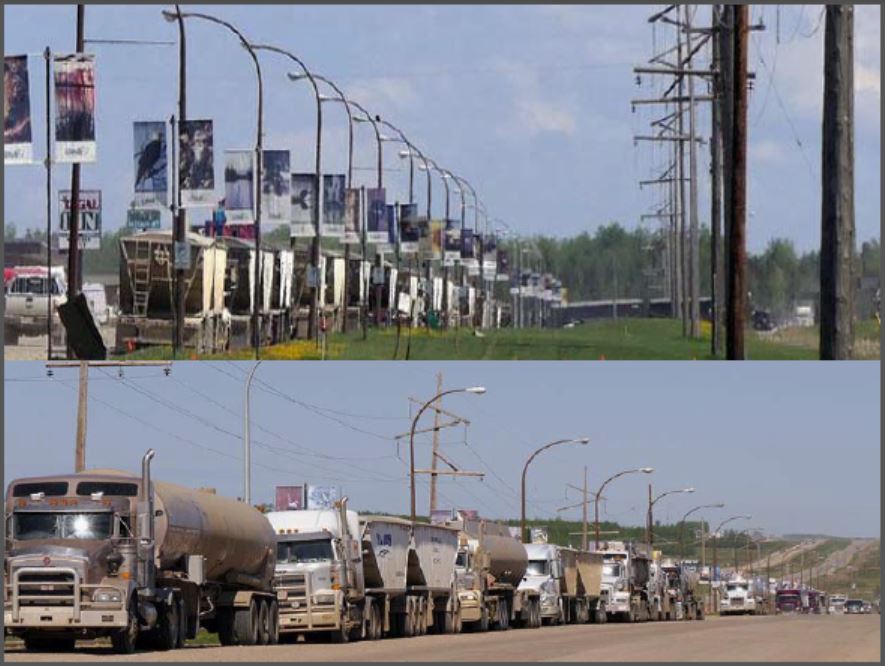
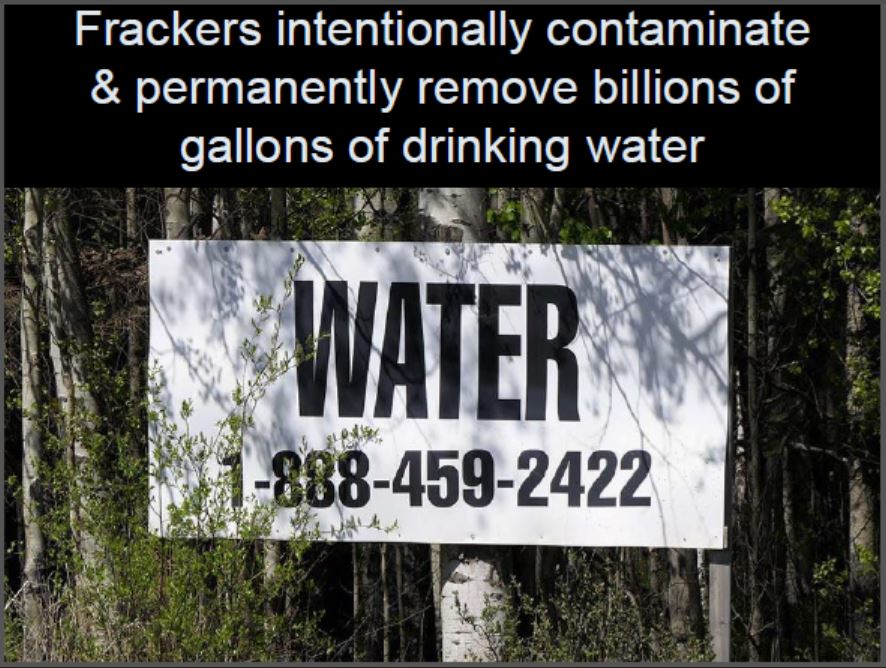
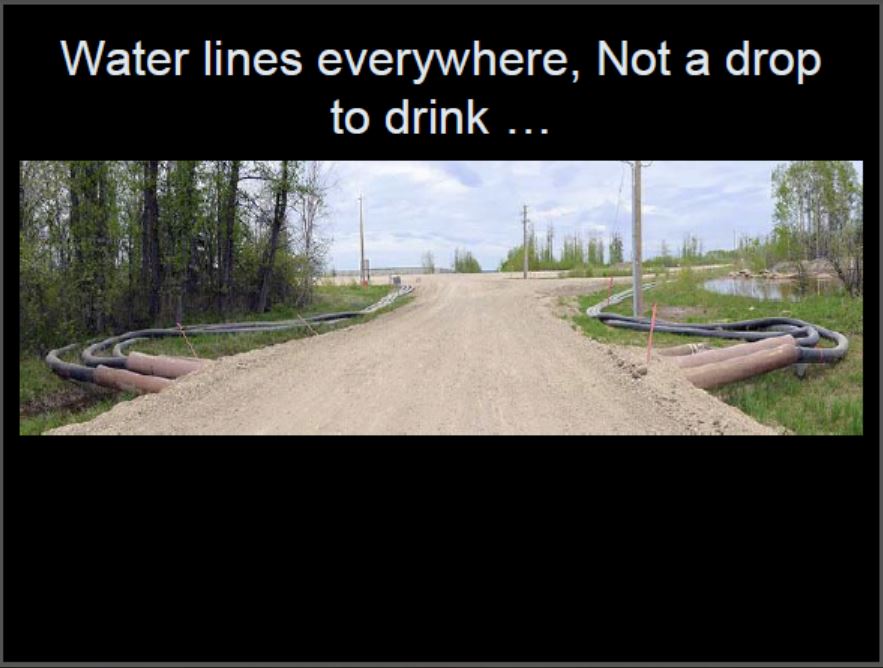
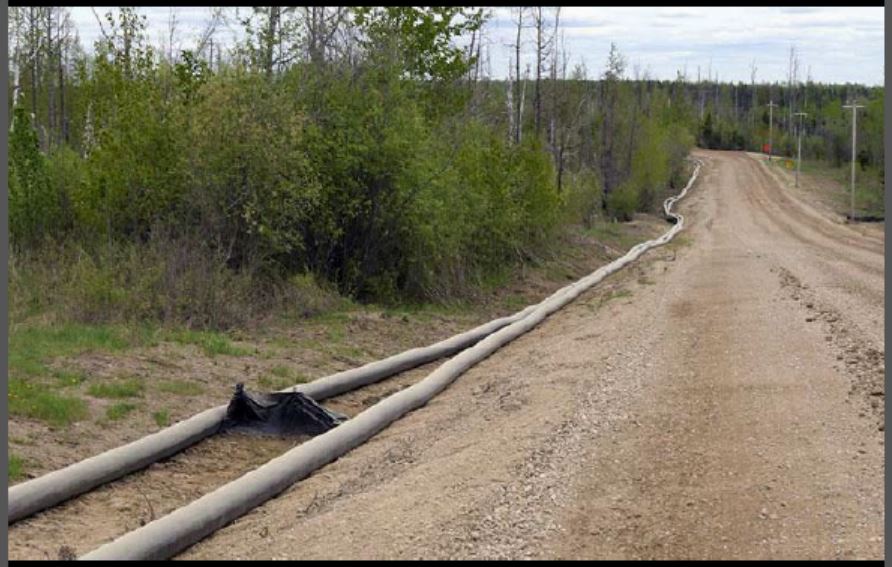
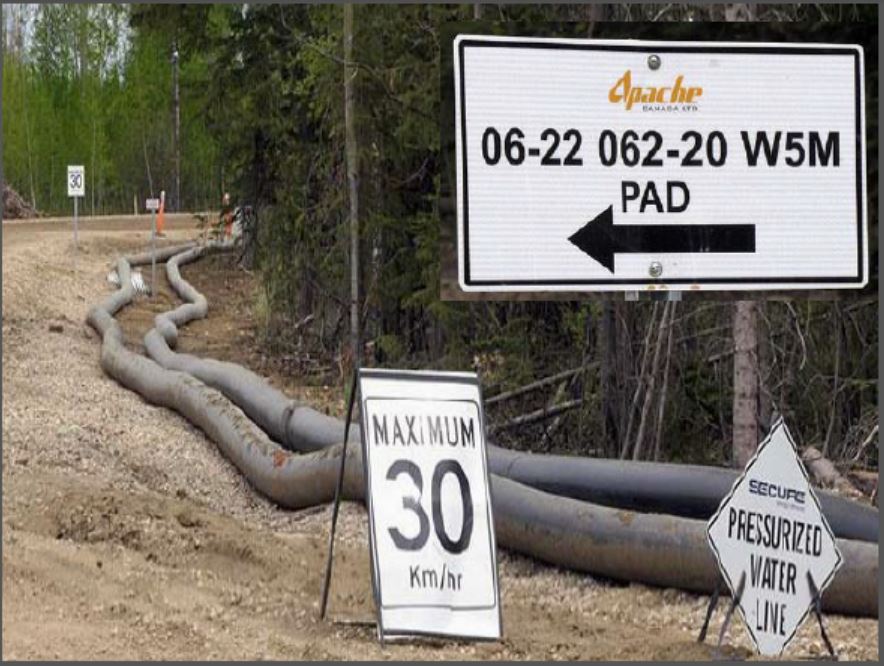
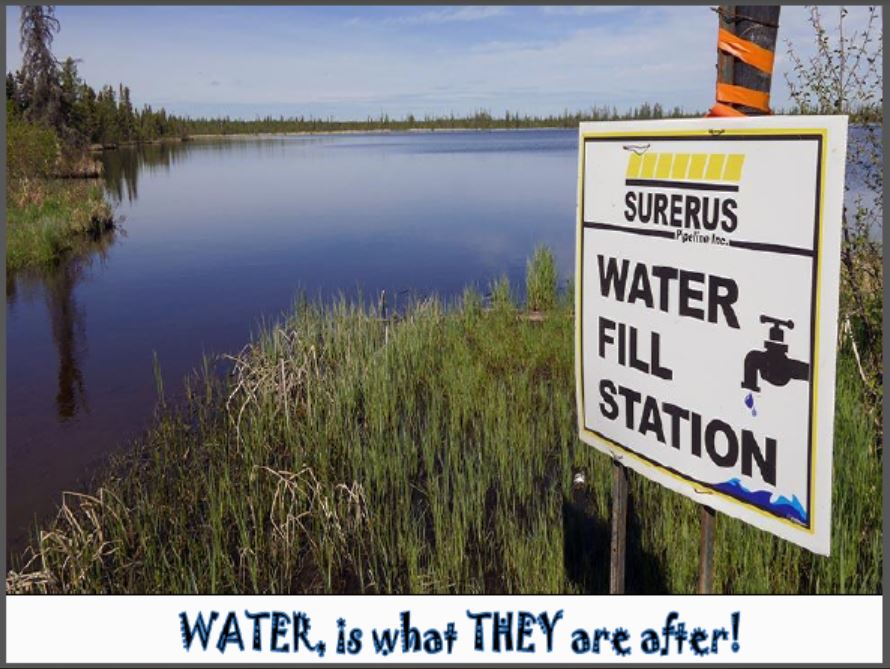
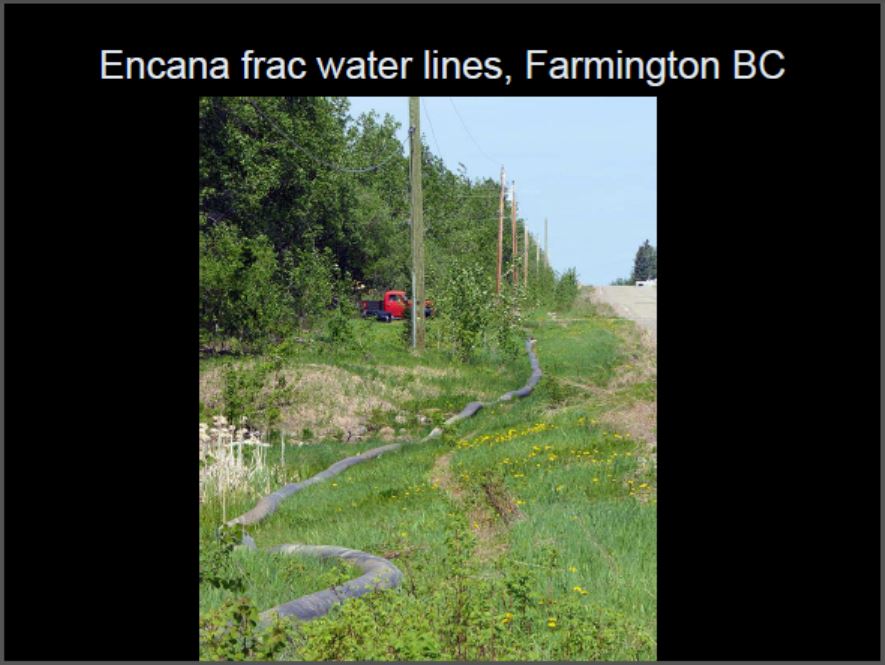
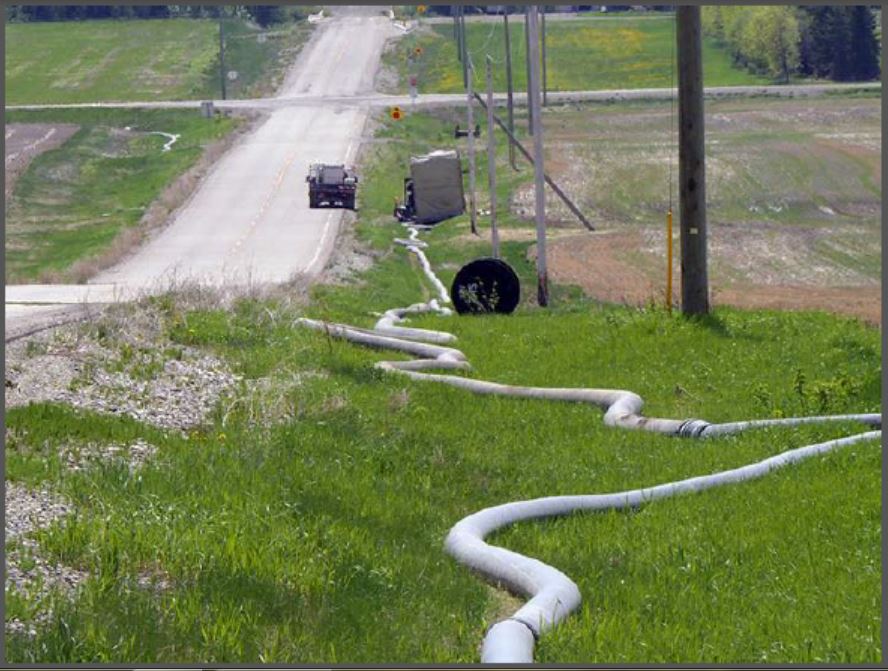
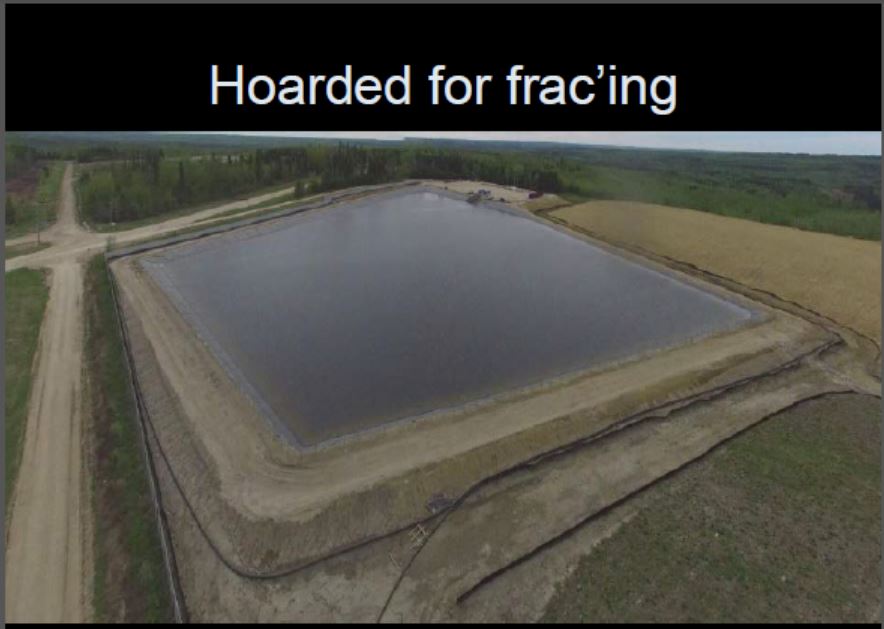
Do you see any lining repair crews?
Where is the regulator demanding the ripped lining be repaired?
AND TO MAKE BILLIONS OF GALLONS OF TOXIC FRAC WASTE STORED ALSO IN DAMS, MANY WITH RIPPED LININGS, ONE (HOW MANY MORE LEAKING, WITH GROUNDWATER NOT MONITORED?) THE OGC ALREADY FOUND LEAKING, CONTAMINATING FRESH GROUND WATER:
THINK HOW EVIL SYNERGY IS: GETTING GROUPS COLLABORATING, ASKING ASK FOR REGULATIONS, THEREBY STOMPING ON THE VOICES OF FAMILIES HARMED BY FRACKING!
THINK ABOUT COMPANIES HOARDING BILLIONS OF GALLONS OF FRESH WATER TO DELIBERATELY TURN TOXIC.
Then think about driving 45 minutes, one way, paying for and hauling 185 gallons of semi-polluted water (re Plains Midstream broke the law, violating “Best in Class” regulations spilling masses of Sour Crude Oil into the drinking water supply for Red Deer, Drumheller and other communities downstream, including where Ernst gets her water from) to bathe in when it’s 30C below zero. All because Encana broke the law, violated those glorious “Best in the World” regulations, contaminating a community’s drinking water aquifers with “World Class” regulators engaging in fraud – repeatedly – and violating Ernst’s rights to cover-up Encana’s crimes.
A coalition of environmental, community and First Nation organizations is calling on the B.C. NDP to broaden a campaign promise to review fracking by instead ordering a full public inquiry or commission.
During the spring provincial election campaign, the NDP announced it would appoint a scientific panel [ANOTHER ONE? THE SCIENCE HAS BEEN IN FOR YEARS! FRAC’ING HARMS GROUNDWATER, ENVIRONMENT, AND FAMILIES AND COMMUNITIES] to review the hydraulic fracturing process to ensure that gas is produced [aka, to ensure fracking goes full steam ahead, harms be damned] safely and the environment is protected, but the coalition suggests that review wouldn’t go far enough.
In a letter issued Monday, the coalition says recent revelations about the fracking process should serve as an impetus for an inquiry.
… The coalition is asking people to sign a petition calling on the provincial government to launch a public inquiry.
With files from The Early Edition
Coalition Calls for Public Inquiry Into B.C. Fracking by Judith Lavoie, November 6, 2017, Desmog.ca
… During this year’s election campaign the NDP acknowledged there are questions about fracking and the party’s election platform said: “With the potential of significant expansion of gas production in the years ahead, we will appoint a scientific panel to review the practice to ensure that gas is produced safely and that our environment is protected.”
The review will include an assessment of the impacts on water and “given recent minor earthquakes in the area,” what role gas production has in seismic activity, it said.
So far, the government has not moved on the scientific review and the mandate letter, given by Premier John Horgan to Energy Mines and Petroleum Resources Minister Michelle Mungall, makes no specific mention of the review, although it could be encompassed in more general endorsements of sustainability and respect for First Nations.
Neither Mungall nor Green Party spokespeople were available to comment for this story.
In 2016, after a scientific study was published drawing a direct line between fracking and earthquakes in the Western Canada sedimentary basin, on the Alberta/B.C. border, Green Party leader Andrew Weaver called for a “moratorium on horizontal hydraulic fracturing until there is a better understanding of its risks.”
In a September interview with DeSmog Canada, Weaver said the problem was not so much the existence of fracking, but the free-for-all approach.
“The right approach would be to pause and reflect on the cumulative impacts of our wild-west approach to resource extraction here in B.C.” Weaver said.
The Green platform called for creation of a natural resources board [Like Alberta’s? What a farce the Green platform is], which could take a detailed look at the cumulative effects. [Emphasis added]
Diana Daunheimer • 3 hours ago
Never has a play been fractured with just water.
Fracture slurries are a complex mix of compounds, which include proppants, energizers, biocides, surfactants, corrosion inhibitors, stabilizers, cross linkers, pH adjusters, gelling agents and scale inhibitors. In some cases, such as the 6 wells that surround our home, and thousands more in hydrophilic plays, no water is used at all, base fluids are hydrocarbons, such as kerosene or gelled propane. Frac oils are sold by numerous suppliers, Shlum, Baker Hughes, Gibsons, Halliburton. CBM wells are often fractured with gases, such as nitrogen.
After the well is fracked, a second set of chemical breakers are pumped down hole, to “break” the gelled slurries, so that fluids return to surface and proppants remain in the induced fractures.
Why wouldn’t this coalition call for a national inquiry, to address known public health and environmental damages from hydraulic fracturing operations, which are prevalent in BC, Alberta and Sask and soon to be in Quebec?
Perhaps it has to do with the contradictory actions of certain CAPE members, such as Dr. Joe Vipond, who is advocating for the disreputable Alberta Climate Plan, in which hydraulically fractured natural gas is referred to as “clean” with “limited adverse impacts.”
[Refer also to:
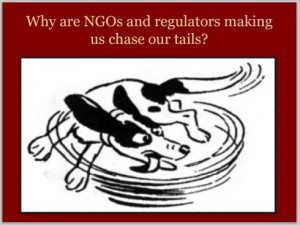
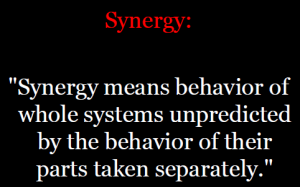
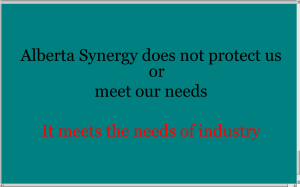
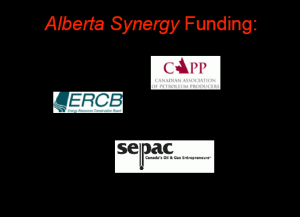
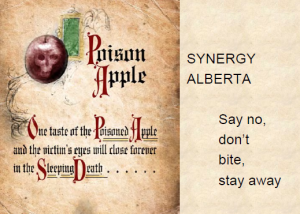
But Canada’s environmental NGOs keep on gobbling up Synergy Alberta’s poisoned apples, going so far into the poison as to ask for “proper funding” to enable more frac’ing.
Slides above from Ernst speaking events (not included in her Malton talk) ]
[Refer also to:
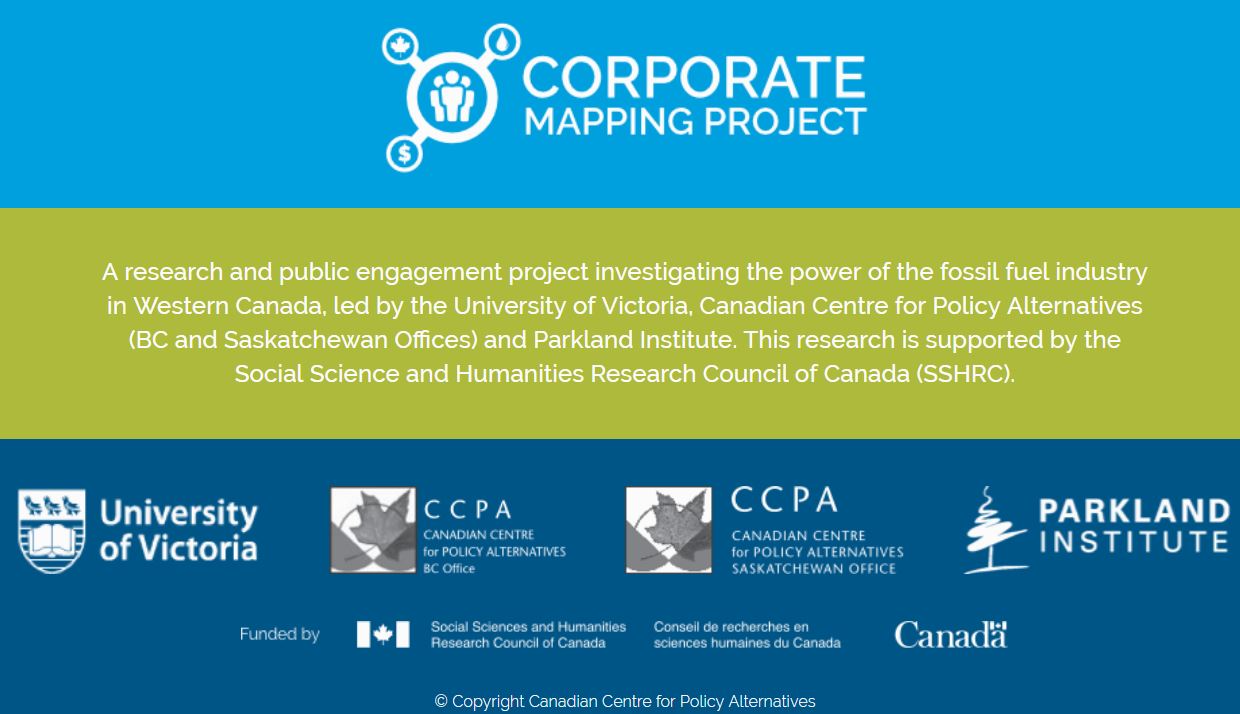
Diana Daunheimer shared National Observer’s post.
October 3 ·
Will this change statutes and legislation to protect the public from oil and gas operations? Will this revoke the powers of legally immune regulators that operate with no public interest or public health mandates and owe no duty of care to the public? Will this ensure proper environmental and public health monitoring will be implemented at all well sites and facilities? Will this enable the medical profession the integrity and knowledge to even consider sour gas impacts on residents, when they present with symptoms of exposure? Will this end repugnant lobbying and synergy groups? Will this address tens of thousands of non-compliant well sites and facilities?
Or is this just job creation, advertising and laundered lobbying for the Corporate Mapping Project?
Review the members of the CMP below: all our counterfeit controlled opposition and largely industry funded environmentalists in one place; Pembina, Forest Ethics (now STAND), Dogwood, Greenpeace, Suzuki, Parkland, 350org, the unions, UNIFOR and Alberta Union, all the academic institutions saturated with industry money, U of C, U of L, MRU and U of North Dakota and of course, those special interest “independent” media sources Desmog, National Observer and Murray Dobbin from Rabble.
It’s horrendous that the industry poisons people, but even more despicable is those that do nothing but sensationalize such hardships, death, illness, and criminal actions, in pursuit of their special interest agendas and funding from taxpayers through the Social Science and Humanities Research Council of Canada.
… Pembina was borne of one of the worst sour gas blow outs in the nation.
What does Pembina do now? They host galas in Toronto, sponsored by Shell, Suncor, Cenovus and Enbridge. They also publish and distribute the Landowners Guide to Oil and Gas Operations, full of synergistic bullshit. Meanwhile, in Alberta, the birthplace of Pembina, 35,000 wells are non-compliant, 7% of all wells are leaking, off lease emissions are permitted, based on the “opinion” of an inspector, sour gas modelling (not testing) only occurs at 5% (H2S is fatal at 1%) and there are chronic, province wide violations regarding on and off site monitoring for industrial emissions.
This type of project means nothing for Canadians, aside from continued misconduct and unethical collaborations, to which they are unknowingly funding.
Corporate Mapping Project:
Steering Committee
Bill Carroll (Co-Director), Department of Sociology, University of Victoria
Shannon Daub (Co-Director), Canadian Centre for Policy Alternatives-BC
Simon Enoch, Canadian Centre for Policy Alternatives-SK
Ian Hussey, Parkland Institute
Ricardo Acuna, Parkland Institute
Thi Vu (Project Manager), Canadian Centre for Policy Alternatives-BC
Core Team
The CMP’s Core Team includes Co-investigators and Project Leads
Laurie Adkin, Dept. of Political Science, University of Alberta
Angele Alook, Alberta Union of Provincial Employees
Clifford Atleo, Resource and Environmental Management, Simon Fraser University
Gwendolyn Blue, Dept. of Geography, University of Calgary
Paul Bowles, Dept. of Economics, University of Northern British Columbia
Angela Carter, Dept. of Political Science, University of Waterloo
Emily M. Eaton, Department of Geography and Environmental Studies, University of Regina
Nana de Graaff, International Relations, Vrije Universiteit Amsterdam (Free University of Amsterdam)
Garry Gray, Dept. of Sociology, University of Victoria
Shane Gunster, School of Communication, Simon Fraser University
Trevor Harrison, Dept. of Sociology, University of Lethbridge
Eelke Heemskerk, Political Science, University of Amsterdam
David Hughes, Global Sustainability Research Inc.
Seth Klein, Canadian Centre for Policy Alternatives-BC
James Lawson, Dept. of Political Science, University of Victoria
Marc Lee, Canadian Centre for Policy Alternatives-BC
Eric Pineault, Dépt. de sociologie, Université de Québec à Montréal
Fiona MacPhail, Dept. of Economics, University of Northern British Columbia
James Rowe, School of Environmental Studies, University of Victoria
JP Sapinski, Dept. of Sociology, University of Victoria
Karena Shaw, School of Environmental Studies, University of Victoria
Gillian Steward, Faculty of Communication Studies, Mount Royal University
Collaborators
Rob Aitken, Dept. of Political Science, University of Alberta
Robert Brulle, Sociology and Environmental Studies, Dept. of Culture and Communications, Drexel University
Val Burris, Dept. of Sociology, University of Oregon
Marjorie Griffin Cohen, Dept. of Political Science, Simon Fraser University
Jessica Dempsey, Dept. of Geography, University of British Columbia
Sara Dorow, Dept. of Sociology, University of Alberta
Robert A. Hackett, School of Communication, Simon Fraser University
Randolph Haluza-Delay, Dept. of Sociology, The King’s University College
David Hughes, Global Sustainability Research Inc.
Tom Juravich, University of Massachusetts Amherst
Geoff Mann, Dept. of Geography, Simon Fraser University
Patrick McCurdy, Dept. of Communication, University of Ottawa
Sourayan Mookerjea, Dept. of Sociology, University of Alberta
Ben Parfitt, Canadian Centre for Policy Alternatives-BC
Patti Sonntag, School of Journalism, Concordia University
Clifford Staples, Dept. of Sociology, University of North Dakota
Andrew Stevens, Dept. of Business Administration, University of Regina
David Tindall, Dept. of Sociology, The University of British Columbia
Community Advisor
Amin Asadollahi, Pembina Institute [!!!!!!!!!!!!!!! There they are!!! Too sneaky!]
Gwen Barlee, Wilderness Committee
Caleb Behn, No institutional affiliation
Charley Beresford, Columbia Institute
Mark Bigland-Pritchard, Low Energy Design Ltd.
Jordan Brennan, Unifor
Christine Boyle, Divestment movement
Jesse Cardinal, Keepers of the Athabasca
Kent Charteris, Saskatchewan Surface Rights
David Climenhaga, United Nurses of Alberta
Aidan Conway, Saskatchewan Union of Nurses
Murray Dobbin, No institutional affiliation
Cam Fenton, 350.org
Joel French, Public Interest Alberta
Andrew Gage, West Coast Environmental Law
Nancy Greyeyes, Committee for future generations/idle no more
Will Horter, Dogwood Initiative
Joseph Jobin, Treaty 8 First Nations of Alberta
Simon Kelly, BC Government and Service Employees’ Union
Emilia Kennedy, Greenpeace
Eugene Kung, West Coast Environmental Law
Crystal Lameman, Beaver Lake Cree and Treaty 6
Chief Phil Lane, Four Worlds International Institute
Carol Linnitt, Desmog Blog
Lana Lowe, Fort Nelson First Nation
Karen Mahon, Forest Ethics Advocacy
Lisa Matthaus, Organizing for Change
Gavin McGarigle, Unifor BC/YK
Josha McNab, Pembina Institute
Kevin Millsip, Next Up
Pat Moss, Northwest Institute
Josh Patterson, BC Civil Liberties Association
Candyce Paul, Committee for future generations
Emma Pullman, Writer, No institutional affiliation
Kathleen Ruff, Northwest Institute
Linda Solomon Wood, National Observer
Jim Stanford (on leave), Unifor
Kevin Thomas, Shareholder Association for Research and Education
Jenny Uechi, National Observer
Marilyn Wapass, Thunderchild First Nation
Kevin Washbrook, Voters Taking Action on Climate Change
John Werring, David Suzuki Foundation
Ben West, Tanker Free BC
Taylor Yee
Advisory Board Members
Rosemary Ommer, Advisory Board Co-Chair, University of Victoria
Ana Maria Peredo, University of Victoria
Jane Pulkingham, Simon Fraser University
Peter Sinclair, Memorial University of Newfoundland
Tony Clarke, Polaris Institute
Gordon Laxer, University of Alberta
[Wouldn’t a legitimate coalition want input from people actually harmed by frac’ing?
Why no harmed landowners on the list of community advisors, eg Stewart Shields, Ronalie and Shawn Campbell, Bruce Jack, Dale and Brenda Zimmerman, Ann Craft, Debbie Signer, Fiona Lauridsen, Diana Daunheimer, Howard and Nielle Hawkwood, Jessica Ernst, etc?]
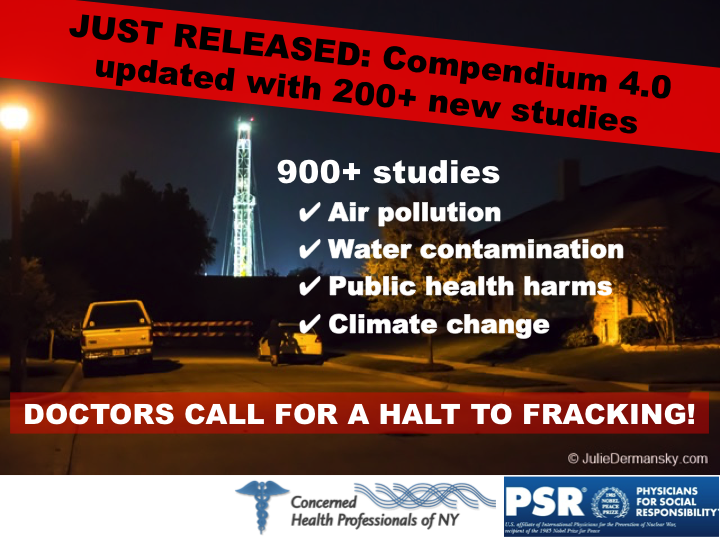
2015 02 05: Is the Yukon Government setting up a fracked territory?
Instead of listening to world-renowned geochemist Dr. Karlis Muehlenbachs, who co-authored a peer-reviewed paper documenting numerous cases of groundwater contamination in Alberta frack fields and warns of the risks from fracking, the Committee listens to the Pembina Institute and Canadian Association of Petroleum Producers (CAPP). Pembina is a synergized group. Synergy is funded by the oil and gas industry and Pembina promotes regulations and the tired old story that natural gas is clean [Refer to article below]. CAPP is Canada’s largest oil and gas industry lobby group that can’t learn to stop lying (Refer to The science is deafening industry’s gas migration for proof that CAPP is lying).
Vancouver: The Council of Canadians made a puzzling announcement in a May 12, 2015 media release, stating that it was supporting a formal request for the Canadian Government to regulate fracking.
Anthony Ingraffea, the Dwight C. Baum Professor of Engineering at Cornell University, summarized the significance of the 400 or so “peer reviewed papers on the health and environmental impacts” from fracking published since 2008. He states that the “vast majority show a clear and present danger,” demonstrating that “many problems are unfixable by regulations of any kind.” Since March 3, 2015, the number of peer reviewed papers on PSE’s Health Energy website has increased to almost 500.
“Has the Council of Canadians crossed a dangerous line? Justification for federal frack regulation has no basis and contradicts its stated aims to ban fracking. If the Council fails to change its position, it will betray the trust it has so far earned from Canadians,” says Will Koop, B.C. Tap Water Alliance Coordinator. “The increasing research and testimonial evidence from those who have been harmed by fracking show that one cannot advocate frack regulation and be opposed to fracking. There is no middle ground.”
2016 11 16: MUST WATCH! CAPP’s Frac Fraud & The Synergy Con 2015
2016 12 20: The only safe fracking regulation is a ban
[We can all be assured, if a public inquiry is granted, and the groups involved well paid and fed, the NDP in BC will let CAPP, AER and Encana dictate regulations around frac’ing to be promised “Best Practices” only – totally unenforceable]
2013 02 14: Synergy Alberta: ‘Free lunches’ for fracking the Karoo
2012 09 29: Without warning, Keepers of the Water remove Jessica Ernst off the Hydraulic Fracturing panel and replace her with a Pembina Institute representative Synergy Extraordinaire!
2011 06 21: ERCB (now AER) on hot seat at synergy group’s open house
2011 04 14: BC Tap Water Alliance calls for public inquiry into frack impacts
“Given the growing concerns associated with contaminated waterways and dangerous migrations of deadly gas associated with shale gas developments, the time has come for the province of British Columbia to conduct a full public inquiry into the environmental and social impacts of the shale gas industry,” says Will Koop of the B.C. Tap Water Alliance.
… “We are concerned with the province’s indifference to this issue. Despite calls from its own Ministry of Environment staff to conduct cumulative environmental assessments of gas industry activities in northeast BC since 1991, the government has failed to do so,” Koop says. “Given the impacts on our environment, human health and significant increases to greenhouse gas emissions over an area that represents about 15 percent of BC’s land mass, we believe the government should immediately implement a rational public review and planning approach to energy developments in B.C.”
2010 11 01: BC Tap Water Alliance: The Komie Commotion, The BIG Gallop to
Siphon British Columbia’s Deep Shale Gas
BC’s Drinking Water Protection Act must be immediately revised to prohibit the fracking use of toxics, chemical poisons mixed with fresh water injected deep into the earth, disturbing, cracking and compromising sealed aquifers. BC’s Water Act, about to be seriously altered ( ” modernized ” ) through a revision process (first such alteration since the late 1800s), must also incorporate this concern. Related environmental and mining Acts and Regulations must also be co-ordinately revised to compliment and harmonize these necessary revisions, and to ban fracking.
Many of North America’s ancient aquifer systems are the source of domestic waters for human and animal (wild, domestic) uses. The B.C. Tap Water Alliance has also come on board (as of February 22, 2010) to help advocate the end of impairing and poisoning North America’s and the Earth’s fresh water aquifers by the oil & gas industry complex through a process nicknamed “fracking”/“fracing” (hydraulic ‘frac’turing) which involves the use of toxic chemicals, and to ban fracking.
[This is what BC Tap Water requested before they got synergized! Big difference between an inquiry to make nice happy voluntary “regulations” and calling for a frac ban]

2006: Pembina Institute joined in the endless tricks and traps trying to “synergize” Ernst. After Ernst went public with Encana’s law violations, Pembina Institute joined Encana on the company’s propaganda tour of Alberta schools, lying with the company about what a great water protector the company is. The environmental group gets paid big dollars from oil and gas, Alberta government, and the regulators. Go read their annual reports.
2004: AER, then EUB, Encana, Alberta Environment endlessly set traps and played tricks trying “synergize” Ernst. Ernst knows how corruptly and nastily Synergy operates, and how cruelly the NGOs work in cahoots with Synergy.
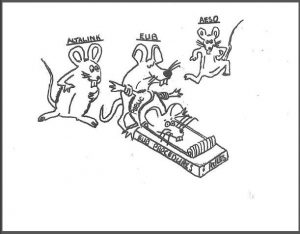
Cartoon from Justice D W Perras 2007 Report on EUB’s “repulsive” spying scandal
EUB (Energy Utilities Board) was ERCB (Energy Resources Conservation Board). After the spying scandal, Alberta govt switched EUB back to ERCB; after Ernst’s lawsuit went public, govt turned it into AER (Alberta Energy Regulator).

